The dark humor of PhD life
Dark humor internet memes on Twitter show some of the emotions PhD students experience during their trajectory. This digital ethnographic blog reflects on these memes and what they say about academic culture.
Dark humor
I remember when, during the introduction for Leiden University PhD students, the convenor shared with us, dozens of fresh PhDs, a statistic: About a third of the PhDs will suffer from mental health issues during their PhD trajectory. It was said almost jokingly, like people sometimes do when they want to alleviate the painful truth by making it sound funny. More than four years later, I realize that this dark humor is an integral part of doing a PhD.
Doing a PhD can be an emotional rollercoaster, and dark humor is a coping mechanism to stay sane. Within the PhD community, internet memes are a way to communicate complex emotions. Twitter timelines have become a space of solidarity, where PhD students can share these emotions within trusted circles. Let me first give you, in a digital ethnographic vignette style, a snapshot of some emotions many PhDs experience. Thereafter, I will argue that this dark humor reveals structural issues in the academic world. This blog can therefore be read as a call to action to rethink the present work culture of academia. The following material was gathered from various PhD Twitter accounts and combined with auto-ethnography. To protect Twitter users' anonimity, in some cases only the image from the Twitter post is shown.
Staying sane
You start off feeling enthusiast about the work ahead. Brilliant ideas overwhelm your brain, there are so many interesting things to write about! “This will be an amazing chapter”, you find yourself thinking. Let’s get to work!
A little while later, however:


Woops, you had expected that chapter to go a bit quicker. How are you ever going to meet the deadline? You probably did not work hard enough. After all, if your supervisor gave you this deadline, that’s because they expect you to be capable of meeting it, right? You should probably compensate for having failed today. Some possible outcomes:
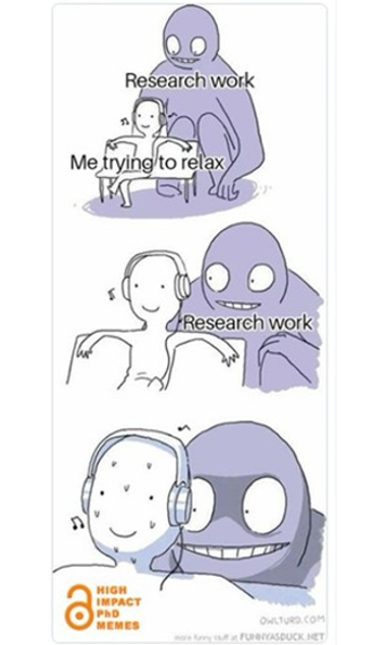

.
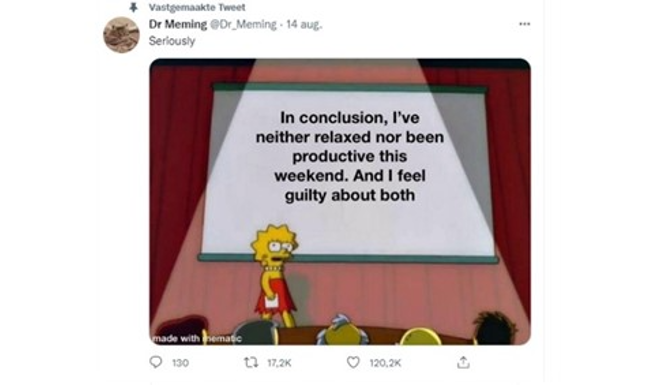

.
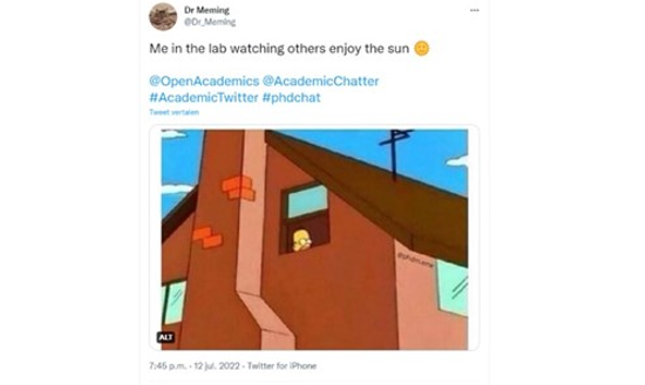

Let’s say you worked through the weekend and this time you managed to get some results. Besides, you put on some music, bought yourself some snacks, made a comfortable work setting. It could have been worse right? And actually, you think you did some really good work. You wrote half of the chapter in just one weekend, amazing! But then:


Ouch… that happens on a regular basis. You think you are doing fine, and then realize that there’s no reason to believe that you are. The people around you are so smart, they will probably soon realize that you are not, right? When this doubt creeps in, a sense of disbelonging comes with it: It’s the ever lurking imposter syndrome. You start thinking about what others will say when they read your chapter, and the sense of having done good work shifts to feeling like this:


The Twitter accounts that make fun of this situation help you relativize. After noticing you share these struggles with PhDs worldwide, you feel seen: the feeling of being understood and acknowledged for the dreary position you are in. Weirdly enough, this shared suffering empowers you. Maybe you are not that dumb after all! Work can continue, eventually meeting the deadline. Your work is in the hands of the gods (supervisor) now.


You keep up the good mood and try to tell yourself “it’s fine” until the moment you are about to receive feedback. It is interesting how much your mood depends on this meeting. The process, the motivation, the satisfaction, they all seem to depend on what your supervisor is going to tell you. You gather your courage and tell yourself that whatever the outcome, you will stay calm. But your supervisor looks at you confused…


…and asks you to explain…


…which never really works…


But before you know it, before you have time to process it or talk to someone, you are off to the next cycle:
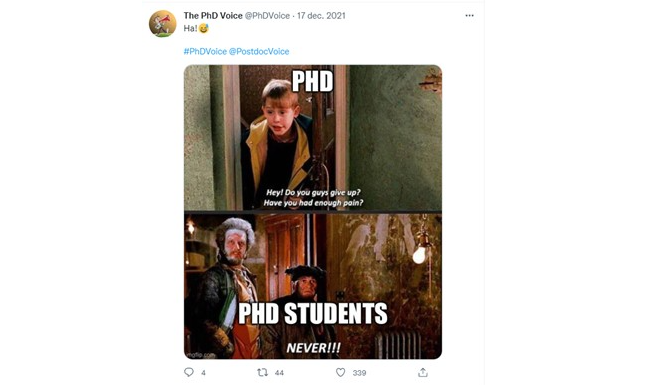

Academic culture
With their humorous take on a painful reality, these memes kept me going. The dark humor of these memes does not suggest there is no joy or fulfillment in a PhD life. There is fun, there are lovely colleagues, and there is the privilege (for some) of being paid for what you are passionate about: Doing research. However, these memes should be a red flag: The academics of the future are trained in a culture of anxiety, precarity, and overwork, leading to mental health struggles. The academic world, often seen as beacon for progressive thought, is home to a very conservative culture. Money is decisive, time inherently lacking (or expectations invariably too high), empathetic supervision a treasure rather than the standard, and there is a strict academic hierarchy.
I am grateful for having gotten the opportunity of doing a PhD, but I also see so much room for improvement to make academia a more inclusive, safe space where people, and knowledge, can thrive. First, PhDs need more than intellectual supervision. A PhD student requires mentorship in the form of empathy, caretaking, emotional support, and other social investments. Second, work pressure, lack of confidence, and job precarity feed a culture of toxic perfectionism. PhDs are squeezed out by unrealistic expectations resulting from the academic rat race. Competitiveness, however, is not the only road to success. Universities, and senior academics specifically, should take responsibility for PhDs’ sanity and break the cycle of reproducing this untenable culture.
At least, opposed to many other PhD candidates worldwide, I received a good salary and I managed to avoid working in the weekends and skipping vacation most of the times. Unfortunately, however, I also ended up in the large pool of PhD students that is not finished by the time their contract ends, and continues to work after. But that’s for another blog.
Thank you to @Dr_Meming, @PhDJourney07, @PhDVoice, and others in the PhD Twitter community for your openness about struggles experienced during the PhD trajectory.


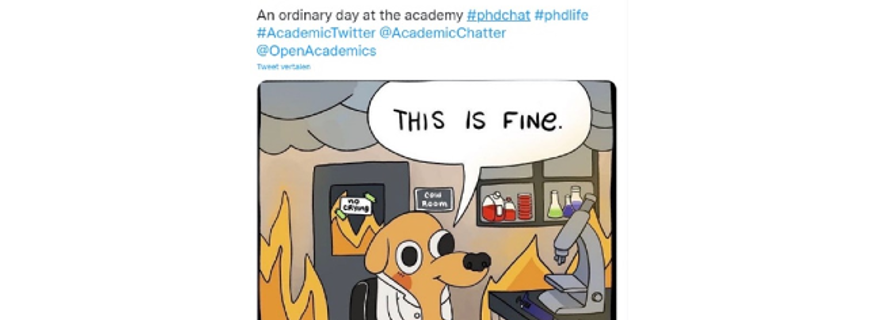
1 Comment
Thanks for sharing this, Vincent! There's a lot of work to be done, and it is really important to hear about your experiences and those of other PhDs to fashion a better trajectory.
Add a comment